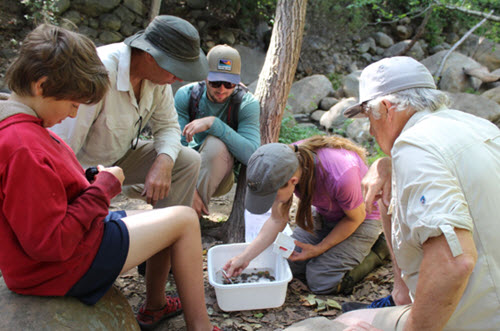VENTURA — Local biodiversity conservation group Paso Pacifico hosted a unique workshop on April 14, giving science and nature lovers an up-close look at how to monitor water quality using aquatic insects, which serve as a simple yet effective indicator species.
Jenna Stanek, a fisheries and wildlife biologist from the Southern Sierra Research Station, led the hands-on learning experience, which took place along the creek at Rocky Nook Park in Santa Barbara.
This event is part of a new project called, “Restoring Fire-affected Riparian Habitat for Federally Listed Birds and other Wildlife Species in the Los Padres National Forest,” developed by project partners Paso Pacifico, the American Bird Conservancy, and the Southern Sierra Research Station. The goal of the project is to develop ecological restoration action plans to benefit at-risk species of birds, fish, and amphibians in the Los Padres National Forest that have been impacted by the Zaca Fire.
Creating and maintaining healthy watersheds is an imperative part of the restoration plan, and directly impacts all of the targeted at-risk species, including Least Bell’s Vireos, Southwestern Willow Flycatchers, Yellow-billed Cuckoos, and steelhead trout. Aquatic insects can provide meaningful clues about the overall health of the streams and watersheds in the Los Padres National Forest and beyond.
Funding for the project is provided by the National Fish and Wildlife Foundation, under the Wildlife Restoration Grant Program.
About Paso Pacifico: The mission of Paso Pacifico is to restore and protect the Pacific Slope ecosystems of Mesoamerica. These habitats include the endangered dry tropical forest, mangrove wetlands, and eastern Pacific coral reefs. By working with local communities, landowners, and partner organizations, Paso Pacifico restores and protects the habitats that form building blocks for wildlife corridors. Paso Pacifico also lends its expertise to help migratory wildlife on the Central Coast of California, including threatened migratory birds and whales that overwinter in Mesoamerica. Through its high-impact programs, Paso Pacifico has established itself as one of the world’s leading biodiversity conservation organizations.

